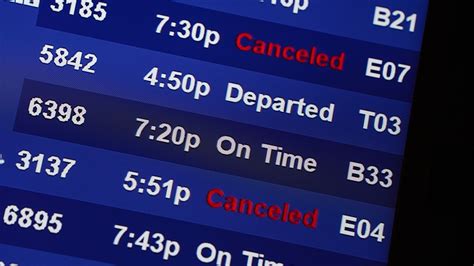
Global Crossing Airlines, a budget carrier aiming to connect smaller U.S. cities to destinations in Latin America and the Caribbean, ceased operations abruptly on Friday, leaving thousands of passengers stranded and flights canceled. The airline cited unsustainable financial strain as the primary reason for the shutdown, effective immediately.
Global Crossing Airlines, operating under the trade name “GlobalX,” announced the immediate cessation of all flights, impacting travel plans for thousands of passengers particularly during the peak summer travel season. The Miami-based carrier, which specialized in charter and ACMI (Aircraft, Crew, Maintenance, and Insurance) operations alongside its scheduled services, attributed the shutdown to insurmountable financial challenges that made continued operation untenable.
The airline’s announcement, made via a brief statement on its website, offered scant details, but confirmed the grounding of its fleet and the cancellation of all future bookings. “Global Crossing Airlines regrets to announce that it has ceased operations effective immediately,” the statement read. “The company has faced significant financial headwinds that have made it impossible to continue flying. We apologize for the inconvenience this has caused to our passengers.”
Stranded Passengers and Travel Disruptions
The sudden halt in operations has triggered widespread disruption for passengers holding tickets for future GlobalX flights. Many travelers found themselves stranded at airports in the United States, the Caribbean, and Latin America, with limited recourse and facing potentially high costs to rebook flights with other airlines. Social media platforms quickly filled with complaints from affected passengers detailing their frustration and anxiety.
“I’m stuck in Cancun with my family, and GlobalX is nowhere to be found. No refunds, no assistance, just stranded,” lamented one passenger on Twitter. Similar stories emerged from other destinations, including Havana, Santo Domingo, and various cities within the United States. The airline’s customer service channels were reportedly overwhelmed, with long wait times and limited information available to passengers seeking assistance.
Travel industry experts criticized GlobalX for the abruptness of the shutdown and the lack of adequate contingency planning to mitigate the impact on passengers. “Airlines have a responsibility to ensure that passengers are not left in the lurch when things go wrong,” said John Strickland, an aviation consultant at JLS Consulting. “In this case, GlobalX appears to have failed to meet that responsibility.”
Financial Troubles and Operational Challenges
Global Crossing Airlines’ demise follows a period of financial instability and operational challenges. The airline, which began flying in 2021, had ambitious plans to expand its network and fleet, but faced stiff competition from established carriers and fluctuating fuel prices.
According to financial analysts, GlobalX had struggled to achieve profitability despite its efforts to diversify its revenue streams through charter and ACMI operations. The airline’s financial statements revealed mounting losses and a growing debt burden, raising concerns about its long-term viability.
“GlobalX was operating in a highly competitive market, and it faced significant headwinds from rising costs and intense price competition,” said Helane Becker, an airline analyst at Cowen. “The airline’s business model may not have been sustainable in the current environment.”
In addition to financial pressures, GlobalX encountered operational challenges, including delays in obtaining necessary regulatory approvals and difficulties in managing its fleet and crew. The airline’s on-time performance was reportedly below industry average, leading to customer dissatisfaction and reputational damage.
Regulatory Scrutiny and Passenger Rights
The shutdown of Global Crossing Airlines has drawn scrutiny from regulatory agencies, including the U.S. Department of Transportation (DOT). The DOT is responsible for protecting consumer rights in air travel and ensuring that airlines comply with federal regulations.
In a statement, the DOT said it was “closely monitoring the situation” and would take appropriate action to ensure that passengers affected by the GlobalX shutdown are treated fairly. The agency reminded passengers that they may be entitled to refunds for canceled flights and reimbursement for certain expenses, such as accommodation and meals.
“Passengers have rights, and we will work to ensure that GlobalX honors its obligations,” said a DOT spokesperson. “We urge affected passengers to file complaints with the airline and the DOT if they are not receiving adequate assistance.”
Consumer advocacy groups have also called for greater transparency and accountability in the airline industry, arguing that passengers need better protection against airline failures and disruptions.
“The GlobalX shutdown is a reminder that airline travel can be unpredictable, and passengers need to be aware of their rights,” said a spokesperson for the Consumer Federation of America. “We need stronger regulations to protect passengers from being stranded or losing their money when airlines go out of business.”
Impact on the Aviation Industry
The collapse of Global Crossing Airlines sends ripples through the broader aviation industry, particularly within the niche market of smaller-city connectivity to Latin America and the Caribbean. It also underscores the volatility and competitive pressures that airlines, especially smaller and budget-focused carriers, face in an environment of fluctuating fuel costs, labor shortages, and evolving travel demands.
Experts suggest that the failure of GlobalX might lead to a consolidation of smaller players within the market, with larger airlines potentially acquiring assets or routes vacated by the defunct carrier. This could result in reduced competition and potentially higher fares for consumers in the long term.
Moreover, the incident could impact investor confidence in smaller airlines and the ACMI (Aircraft, Crew, Maintenance, and Insurance) business model, making it more difficult for new entrants to secure funding and operate successfully.
Refunds and Compensation for Affected Passengers
Passengers holding tickets for canceled GlobalX flights are advised to seek refunds from the airline. However, given the company’s financial distress, there is no guarantee that all passengers will receive full reimbursement.
The DOT recommends that passengers first contact GlobalX directly to request a refund. If the airline fails to respond or provide a refund within a reasonable time, passengers can file a complaint with the DOT or seek reimbursement through their credit card company.
Passengers who purchased travel insurance may also be able to claim compensation for canceled flights and related expenses. However, the terms and conditions of travel insurance policies vary, and passengers should carefully review their coverage to determine what benefits are available.
In some cases, passengers may be able to pursue legal action against GlobalX to recover their losses. However, legal proceedings can be costly and time-consuming, and there is no guarantee of success.
Future of Global Crossing Airlines
The future of Global Crossing Airlines remains uncertain. It is possible that the airline could be acquired by another company or restructured under bankruptcy protection. However, given the extent of its financial problems, it is also possible that the airline will be liquidated, and its assets sold off.
Regardless of the outcome, the GlobalX shutdown serves as a cautionary tale about the challenges facing smaller airlines in a competitive and volatile industry. It also highlights the importance of protecting passenger rights and ensuring that airlines are held accountable for their actions.
Analysis of the GlobalX Business Model
Global Crossing Airlines aimed to fill a niche in the market by connecting underserved smaller cities in the United States with destinations in Latin America and the Caribbean, leveraging a low-cost business model. This strategy, while potentially appealing to price-sensitive travelers, faced numerous challenges that ultimately contributed to its failure.
One critical aspect of their business model was the reliance on charter and ACMI operations to supplement scheduled flight revenue. While ACMI contracts can provide a stable income stream, they also require significant capital investment in aircraft and crew, along with robust operational management. Failure to secure enough profitable contracts or manage these resources effectively could quickly erode profitability.
Moreover, GlobalX’s low-cost structure meant they were highly susceptible to fluctuations in fuel prices and other operating costs. The airline industry is notoriously sensitive to these external factors, and smaller carriers often lack the financial reserves to weather prolonged periods of high costs or decreased demand.
Competition from larger, more established airlines also posed a significant threat. These carriers often have greater economies of scale, stronger brand recognition, and more extensive route networks, making it difficult for smaller airlines to compete on price and service.
The Role of External Factors
Several external factors further exacerbated Global Crossing Airlines’ financial woes. The COVID-19 pandemic had a profound impact on the airline industry, leading to a sharp decline in travel demand and increased uncertainty. While travel has rebounded in recent years, the recovery has been uneven, and some segments of the market remain depressed.
Rising fuel prices, driven by geopolitical tensions and supply chain disruptions, also put pressure on airlines’ bottom lines. Fuel is one of the largest operating expenses for airlines, and even small increases in fuel prices can significantly impact profitability.
Labor shortages, particularly among pilots and mechanics, have also created challenges for airlines. These shortages have led to increased labor costs and operational disruptions, further straining airlines’ financial resources.
Lessons Learned and Future Implications
The collapse of Global Crossing Airlines offers several important lessons for the airline industry and passengers alike.
For airlines, it underscores the importance of having a sound business model, effective cost management, and a diversified revenue stream. Airlines must also be prepared to adapt to changing market conditions and external factors, such as fuel prices and labor shortages.
For passengers, it highlights the need to be aware of the risks associated with flying on smaller or budget airlines. Passengers should consider purchasing travel insurance to protect themselves against flight cancellations and other disruptions. They should also be prepared to make alternative travel arrangements if their airline ceases operations.
The GlobalX shutdown also raises questions about the role of government regulation in the airline industry. Some argue that stronger regulations are needed to protect passengers and ensure that airlines are financially stable. Others argue that excessive regulation can stifle innovation and competition.
Ultimately, the Global Crossing Airlines saga serves as a reminder that the airline industry is a complex and challenging environment. Airlines must be well-managed and financially sound to survive and thrive in this industry. Passengers must be aware of the risks involved and take steps to protect themselves.
Alternative Travel Options for Stranded Passengers
Passengers left stranded by Global Crossing Airlines’ sudden closure have several options to explore to resume their travel plans. Here are some potential alternatives:
-
Contact Other Airlines: Immediately check with other airlines that fly similar routes, particularly those with hubs in Miami, or the specific cities where passengers are stranded. Many airlines offer “rescue fares” or discounted rates to accommodate passengers affected by airline bankruptcies or service disruptions. Be prepared to provide proof of your GlobalX ticket.
-
Check Online Travel Agencies (OTAs): Use websites like Expedia, Kayak, Google Flights, or Priceline to search for available flights on alternative airlines. These platforms often provide a broader view of available options and can help you find the most cost-effective solutions.
-
Consider Nearby Airports: If your original departure or arrival airport has limited options, explore alternative airports within a reasonable driving distance. This could open up more flight possibilities and potentially lower fares.
-
Explore Ground Transportation: Depending on the destination, consider alternative modes of transportation such as buses, trains, or rental cars. While this may be less convenient, it could provide a viable option to reach your destination, especially for shorter distances.
-
Contact Credit Card Company: If you purchased your GlobalX ticket with a credit card, contact your credit card company to dispute the charge. They may be able to provide a refund, especially if GlobalX fails to provide the service you paid for.
-
Travel Insurance: If you have travel insurance, review your policy to see if it covers airline bankruptcies or service disruptions. File a claim with your insurance provider to seek reimbursement for your expenses.
-
Government Assistance: In some cases, government agencies may offer assistance to stranded passengers. Check with the U.S. Department of Transportation or the embassy/consulate of your destination country for potential resources.
Economic Impact Assessment
The failure of Global Crossing Airlines is likely to have several negative economic impacts, both directly and indirectly:
-
Job Losses: The airline’s closure will result in job losses for its employees, including pilots, flight attendants, mechanics, and administrative staff. This will increase unemployment rates in the affected areas and reduce overall economic activity.
-
Reduced Tourism: The cancellation of GlobalX flights will negatively impact tourism in the destinations it served, particularly in smaller cities and regions that relied on the airline for connectivity. This will lead to lower revenues for hotels, restaurants, and other tourism-related businesses.
-
Loss of Investment: Investors who provided capital to GlobalX will likely suffer significant losses. This could dampen investor confidence in the airline industry and make it more difficult for other small carriers to raise funding.
-
Ripple Effects: The airline’s closure could have ripple effects throughout the economy, impacting suppliers, vendors, and other businesses that relied on GlobalX for revenue.
Frequently Asked Questions (FAQ)
1. Why did Global Crossing Airlines shut down? Global Crossing Airlines ceased operations due to unsustainable financial strain, citing significant financial headwinds that made continued operation impossible.
2. What should I do if I have a ticket for a canceled GlobalX flight? Contact GlobalX directly to request a refund. If the airline fails to respond or provide a refund, file a complaint with the U.S. Department of Transportation or seek reimbursement through your credit card company or travel insurance provider.
3. Am I entitled to a refund for my canceled GlobalX flight? Yes, you are generally entitled to a refund for a canceled flight. The U.S. Department of Transportation mandates that airlines provide refunds for flights they cancel.
4. Will I be compensated for additional expenses, such as hotel stays or meals, incurred due to the GlobalX shutdown? It depends on the specific circumstances and your travel insurance policy. Contact GlobalX to request compensation, and check the terms and conditions of your travel insurance policy to determine what benefits are available. The DOT might also require the airline to cover reasonable expenses.
5. What are my alternative travel options if I am stranded due to the GlobalX shutdown? Explore options with other airlines, check online travel agencies for available flights, consider nearby airports, explore ground transportation options, and contact your credit card company or travel insurance provider for assistance.
The collapse of Global Crossing Airlines represents a significant disruption in the aviation sector, emphasizing the inherent risks and financial vulnerabilities faced by smaller airlines. As stranded passengers grapple with the fallout, the industry grapples with the lessons learned and the need for robust safeguards to protect consumer interests. While the immediate impact is felt by travelers and employees, the long-term implications could reshape the landscape of regional air travel and influence investment strategies within the airline industry.









